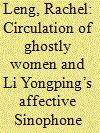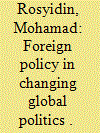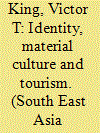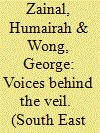|
|
|
Sort Order |
|
|
|
Items / Page
|
|
|
|
|
|
|
| Srl | Item |
| 1 |
ID:
154719


|
|
|
|
|
| Summary/Abstract |
Li Yongping’s writing displays an acute sensitivity to the changing cultural and historical positioning of the Sinophone Malaysian (Mahua) community and his own migratory experiences. This article focuses on Li’s incessant engagement with issues of gender and feminine sexuality in relation to the shifting biopolitical construction of a hybrid Sinophone Malaysian identity. Through an analysis of Li Yongping’s short story collection, The Snow Falls in Clouds (2002), I aim to examine how he deploys the trope of a prostitute figure to evoke the complexities of a Sinophone Malaysian identity and identification as a consistently reinvented affective product. Li’s keen awareness of the trafficking of desirable Chinese female bodies in Southeast Asia is inextricable from Sinophone Malaysia’s cultural history and community formation. Spectral feminine images reflect the increasingly porous and deterritorialized boundaries of citizenship, community, and nationalism complicating the concept of “Chineseness” and an affective Sinophone Malaysian subjectivity.
|
|
|
|
|
|
|
|
|
|
|
|
|
|
|
|
| 2 |
ID:
154722


|
|
|
|
|
| Summary/Abstract |
Since President Jokowi came to power in October 2014, Indonesia’s foreign policy has undergone fundamental change, most obviously in the state’s emphasis on domestic priorities rather than global engagement. Although Jokowi’s foreign policy has pursued an ‘active’ principle by participating in many international forums, it seems to have overlooked the changing contexts of the geopolitical turn. Asia has been rising and is becoming the geopolitical center of gravity in the 21st century. Yet, instead of adapting to this shift, Indonesia’s foreign policy continues to neglect the ‘Asian Century’ turn that has been taking place for years. Indonesia should have increased its international profile to enhance its status as a ‘Third Asian Giant’ beside China and India, but Jokowi’s administration has not taken such an opportunity. This article argues that Indonesia is not interested in gaining international status because of the domestically focused nature of its foreign policy. Indonesia is seen as needing to consolidate its own national resilience before asserting itself in a wider international arena. For Jokowi, national interest is defined as material—primarily economic—interest. In addition, Indonesia’s traditional status as a regional, middle level international power prevents the country from seeking any greater global status. This article argues, with optimism, that Indonesia should seek to change this traditional paradigm of middle power status. It suggests that the assertion of global status matters in Indonesia’s foreign policy because the better the country’s position in the international hierarchy of states, the easier it will be for the nation to achieve its own domestic interests.
|
|
|
|
|
|
|
|
|
|
|
|
|
|
|
|
| 3 |
ID:
154723


|
|
|
|
|
| Summary/Abstract |
In this study of the relationships between identity, material culture and tourism some of the different roles of the anthropologist in engaging with the wider field of cultural identity are examined. It commences with the approach of the conceptually-oriented anthropologist in addressing issues of culture, identity and ethnicity. Then it explores the role of the anthropologist in an applied mode with regard to the ritual cloths of the Iban of Sarawak, Malaysia. It argues for the importance of advocacy and persuading governments to acknowledge the importance of material emblems of identity and to ensure that indigenous knowledge and skills are sustained and contribute to local livelihoods. Finally the study considers the anthropologist as tourist and the ways in which an informed mode of travelling, in this case engaging with North-west Coast American/Canadian Indian totem poles, can contribute to the development of a comparative anthropology of tourism. It is argued that comparisons between Sarawak and the North-west Coast in the context of issues of identity, material culture and tourism can contribute to an understanding of the ways in which items of material culture are deployed and transformed in globalising processes of identity construction and transformation.
|
|
|
|
|
|
|
|
|
|
|
|
|
|
|
|
| 4 |
ID:
154721


|
|
|
|
|
| Summary/Abstract |
The author conducted a case study of Anggerek Desa Technology Park in Brunei Darussalam, using an economic sociology approach, to understand the knowledge flow process among small and medium businesses in the ICT sector. Anggerek Desa is a technology park that was designed by the Government of Brunei Darussalam in a top-down manner. The field study and analysis employed a mode of thick description in which data was collected through a combination of in-depth semi-structured interviews with 51 companies and policymakers in the Brunei Economic Development Board (BEDB), E-Government National Centre (BEDB) and Authority for Info-Communications Technology Industry (AiTi), observation and archival analysis from 2013 to 2015. The author contends that knowledge flow among smaller ICT start-up companies in Anggerek Desa takes place via informal networking activity and channels of communication. The informal communication links between the ICT companies have persisted, even after the companies relocated outside Anggerek Desa. The government has taken initiatives to tap into the existing knowledge flow by setting up a business incubator named iCenter and by providing training to ICT workers in the CRAFT facility.
|
|
|
|
|
|
|
|
|
|
|
|
|
|
|
|
| 5 |
ID:
154720


|
|
|
|
|
| Summary/Abstract |
At the turn of the millennium, inhabitants of a small Karen village situated in one of Thailand’s UNESCO World Heritage Sites sought access to environmental justice in the Thai courts over industrial pollution that had contaminated their local stream with lead and caused them years of degraded health and social misery. The Karen villagers were only able to gain access to justice with the help of NGOs that served them as a support group during a period when Thailand was experiencing active civil and democratic awakening. The NGOs, which had a common cause with the Karen villagers, helped them enter the ‘environmental justice frame’ and its discourse. Their experience of lead pollution was framed within a moral ‘rhetoric of exposure’, which came to guide their activism against intransigent agencies and policies, as well as their mobilization for access to justice.
|
|
|
|
|
|
|
|
|
|
|
|
|
|
|
|
| 6 |
ID:
154718


|
|
|
|
|
| Summary/Abstract |
This article critically examines the hijab debate in Singapore by drawing upon the lived experiences of Singaporean Malay-Muslim women whose daily lives are fraught with a constant negotiation between their identities as veiled women and the institutionalized constraints that impede their social mobility and voices in the public arena. Drawing upon publicly accessible data and findings from in-depth interviews with Malay-Muslim nurses, the article explores the everyday lived struggles of women working in Singapore’s public healthcare sector organizations. These struggles illustrate a decade-old public debate on the hijab. We show how these women’s narratives reflect their intersectional subjectivities, which unravel dominant state discourses on multiracialism that claim the incompatibility of the hijab with secularism. We argue that a re-positioning of the existing debate beyond its dominant association with race is crucial in overcoming the political inertia that continues to plague the hijab issue in Singapore.
|
|
|
|
|
|
|
|
|
|
|
|
|
|
|
|
|
|
|
|
|